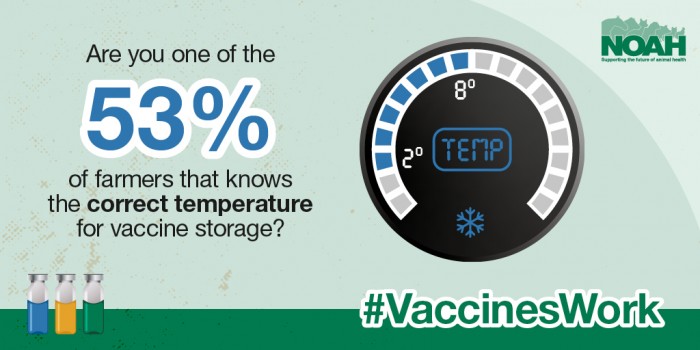The National Office of Animal Health has launched a campaign to encourage livestock producers to store and use vaccines correctly.
It is driving the #VaccinesWork campaign, initiated in the veterinary sector by RUMA in 2018.
The campaign will be working with farmers to raise awareness of how and why vaccines work and the range of diseases they protect against, review and improve how vaccines are stored and administered and encourage use of existing vaccines.
The campaign advice includes important tips for vaccine storage:
- Correct storage between 2-8 degrees (fridge storage) – incorrect storage temperature impacts vaccine potency
- Keeping cool on the road – use a cooler box/bag when transporting vaccines (30 minutes in a hot environment will render it ineffective)
- Use a dedicated medicines fridge
- Middle of the fridge has the most constant temperature
- Store vaccines in date order and use in sequence – ONLY USE vaccines in date
The campaign will feature daily updates and advice on using vaccines correctly on Twitter. Follow #VaccinesWork on Twitter
Dawn Howard, NOAH Chief Executive, said, despite improvements in vaccine use in recent years, research shows that farmers could be losing out, despite their best intentions, if vaccines are not stored properly or administered correctly.
“In this campaign we will focus on simple tips for storing and using vaccines. If this is not done correctly, effectiveness may be reduced, the vaccine may fail to protect animals against disease and farmers may have wasted their efforts, potentially deterring future vaccinations,” she said.
“We will be sharing more tips on handling and disposal. And if you have any questions regarding administration techniques and timing of vaccinations, both your veterinary surgeon and SQP are great sources of information.
“We want to make sure that every dose counts!”
NPA senior policy advisor Rebecca Veale added: “Vaccinations play a key role in preserving pig welfare, productivity, sustainability and resilience of pig units. If vaccines are not stored correctly, it can make them less effective, and therefore costly in terms of pig health.”




